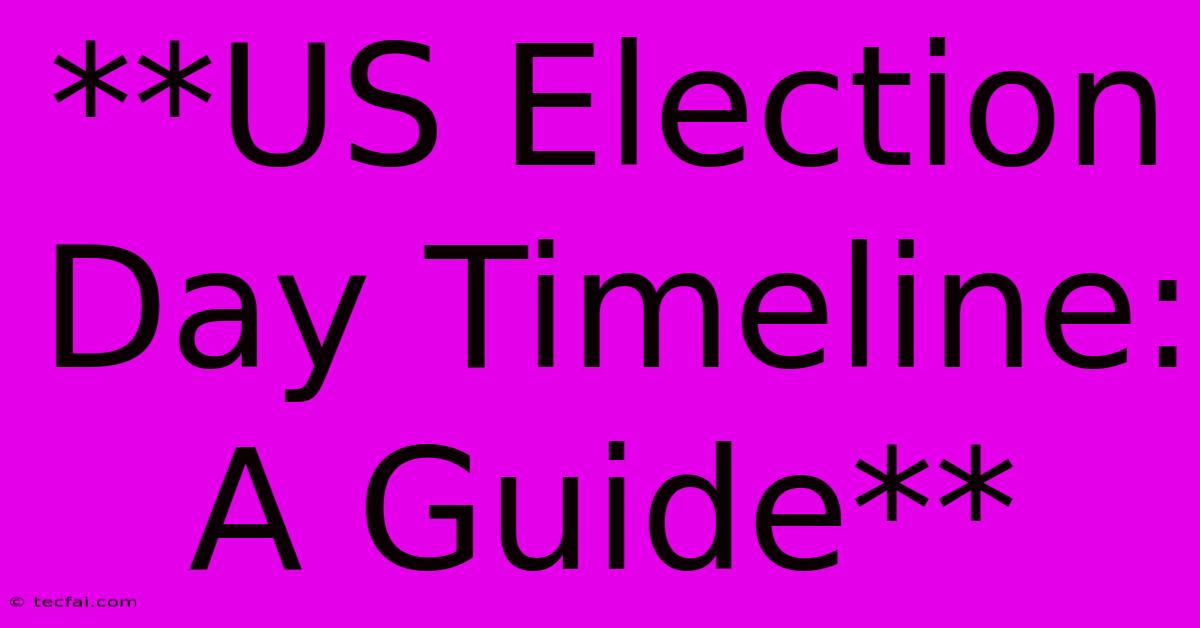**US Election Day Timeline: A Guide**

Discover more detailed and exciting information on our website. Click the link below to start your adventure: Visit Best Website tecfai.com. Don't miss out!
Table of Contents
US Election Day Timeline: A Guide
The US Presidential Election is one of the most significant events in the global political calendar, attracting worldwide attention. For Americans, it's a day of civic duty, excitement, and sometimes, anxiety. To navigate this complex day, it's crucial to understand the key events and timelines. This comprehensive guide will walk you through everything you need to know about Election Day in the US.
Before Election Day: Getting Ready
- Registration Deadline: Make sure you're registered to vote! Check your state's registration deadline well in advance.
- Early Voting: Many states offer early voting, which allows you to cast your ballot before Election Day. Check your state's rules and deadlines for early voting.
- Sample Ballot: Familiarize yourself with the candidates and issues on your ballot by reviewing the sample ballot provided by your county or state.
Election Day: The Breakdown
Morning:
- Polls Open: Polls open at different times depending on your state and county. Check your local election office for specific opening hours.
- Casting Your Vote: Head to your assigned polling place, present your photo ID (if required), and cast your vote.
- Media Coverage: News channels will start broadcasting live updates and analysis from early morning.
Afternoon:
- Exit Polls: As voters leave polling places, they may be asked to participate in exit polls, which provide a snapshot of early voting patterns.
- Live Election Coverage: News networks will intensify their coverage, providing updates on vote counts and projections.
Evening:
- First Results: Results from early voting and some states will start appearing as polls close in different time zones.
- Key Battleground States: Focus will shift to key battleground states, where the race is expected to be close.
- Projected Winner: As more results come in, news networks will start projecting winners for different races.
Late Night:
- Official Results: Official vote counts will continue to be tallied and released by state election officials.
- Concession Speeches: Candidates may concede defeat, while the declared winner will typically address the nation.
Post-Election:
- Recounts and Challenges: If the race is close, candidates may request recounts or challenge the results in court.
- Inauguration: The elected President and Vice President will be sworn into office on January 20th following the election year.
Understanding Election Day
Key Terms:
- Polling Place: The location where you cast your vote.
- Ballot: The paper or electronic document on which you mark your choices for candidates and issues.
- Vote Counting: The process of tabulating the votes received at each polling place and reporting them to the state.
- Electoral College: A system in the US where electors from each state choose the President and Vice President.
Staying Informed:
- Reputable News Sources: Get your information from reliable and unbiased news sources.
- Local Election Office: Check your local election office website for specific information about your state and county's election procedures.
Your Role in the Election
Election Day is a fundamental part of American democracy. Your vote matters! By understanding the timeline and procedures, you can participate effectively and contribute to the process.

Thank you for visiting our website wich cover about **US Election Day Timeline: A Guide**. We hope the information provided has been useful to you. Feel free to contact us if you have any questions or need further assistance. See you next time and dont miss to bookmark.
Featured Posts
-
2024 Acc Field Hockey All Conference Selections
Nov 05, 2024
-
Rogan Endorses Trump Hours Before Vote
Nov 05, 2024
-
Everton Monday Southampton Fallout Academy Success
Nov 05, 2024
-
Olympian Imane Khelif Declared Male The Impact
Nov 05, 2024
-
Trump Calls Jill Stein A Favorite Politician
Nov 05, 2024
